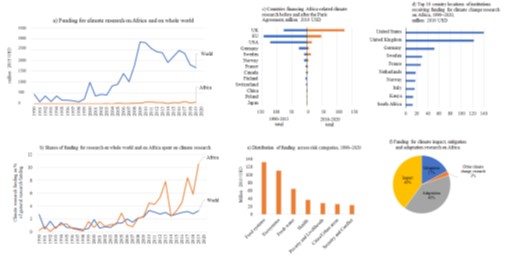Over the past three decades Africa received just 3.8% of climate-related research funding globally, with most of this funding going to institutions in Europe and North America.
This is despite the fact that most African countries have contributed among the least to global greenhouse gas emissions causing climate change, yet have already experienced widespread losses and damages.
According to the latest Intergovernmental Panel on Climate Change (IPCC) report, titled “Climate Change 2022: Impacts, Adaptation and Vulnerability", 3.3 to 3.6 billion people are living in climate “hot spots", with most of these areas in Africa, Asia and South America. The report was released on Monday, 28 February 2022.
According to the chapter on Africa, climate-related research in Africa “faces severe funding constraints, with unequal funding relationships between countries and with research partners in Europe and North America. This figure is “incommensurate with Africa's high vulnerability to climate change."

Furthermore, almost all funding for Africa-related climate research originated outside Africa: “From 1990 to 2020, 78% of funding for Africa-related climate research flowed to institutions in Europe and the United States – only 14.5% flowed to institutions in Africa. Kenya (2.3% of total funding) and South Africa (2.2%) are the only African countries among the top 10 countries in the world in terms of hosting institutions receiving funding for climate-related research on Africa", they write.
The implications of this latest report for Southern Africa were discussed during a recent webinar hosted by the African Climate Development Initiative (ACDI) at the University of Cape Town (UCT) and the School for Climate Studies (SCS) at Stellenbosch University (SU).
During the webinar, Dr Chris Trisos, one of the coordinating lead authors on the Africa-chapter, said existing research funding focuses most on ecosystems, food systems and water, with much less funding for other sectors at high risk such as health and cities. Dr Trisos is associated with the African Climate Development Initiative (ACDI) at UCT.
This lack of Africa-focused research, by African scientists, has serious implications. Not only are research agendas shaped by a Global North perspective, but African researchers are positioned primarily as recipients engaged to support these research agendas instead of being equal partners in setting the agenda. These inequities in funding and research leaderships reduce our adaptive capacity.
According to the report, an analysis of more than 15 000 climate change publications found that, for over 75% of African countries, 60-100% of climate change publications on these countries did not include a single local author. Authorship was dominated by researchers from richer countries outside Africa.
The situation is further exacerbated by the lack of data coming out of Africa:
- Sparse and intermittent weather station data limit attribution of climate trends to human-caused climate change for some areas of Africa, such as Central Africa, and hinder more accurate climate change projections;
- Only 25 of the 54 African countries on the continent conducted one nationally representative survey that could be used to construct measures of poverty during 2000-2010, and 14 conducted none over this period.
“Because of these challenges," they write, “much of what is known about climate impacts and risks in Africa relies on evidence from global studies that use data largely from outside Africa".
What is Southern Africa's potential to adapt?
At a colloquium organised by South Africa's Presidential Climate Commission on 3 March 2022, Prof Guy Midgley said few people recognise that land ecosystems and ocean surface absorb two thirds of our emissions: “These ecosystems have been absorbing a large chunk of our emissions for decades. It is vital that we protect them. Ecosystem-based adaptation and mitigation in Africa are enormously valuable in our sustained response to climate change." Prof Midgley is interim director of the School for Climate Studies (SCS) at SU, and head of the global change biology group in the Department of Botany and Zoology. For the IPCC WG2 report, he was a co-lead author on Chapter 16 on key risks across sectors and regions.
Dr Debra Roberts, co-chair of the IPCC Working Group 2, says that, in terms of taking action there are two arenas pertinent to Africa: “Firstly, Africa is experiencing the fastest rate of urbanisation in the world. We need to use cities to create more climate-resilient societies. This is an enormous opportunity to do things in a just and equitable manner. Secondly, Africa is privileged to have vast natural resources. By protecting 30 to 50% of our ecosystems and water resources, we can use this rich natural capacity to our advantage." She spoke during the IPCC Africa Brief on Monday 28 February 2022. Dr Roberts is also head of the Sustainable and Resilient City Initiatives Unit in eThekwini Municipality.
Click here for a Fact Sheet on the IPCC's main findings for Southern Africa.
Artwork on the cover of the report: “A Borrowed Planet - Inherited from our ancestors. On loan from our children", by Alisa Singer - www.environmentalgraphiti.org © 2022 All rights reserved. Source: IPCC.
Caption to graph above:
Climate-related research on Africa receives a small proportion of global climate research funding. Source: IPCC WG2 “Climate Change 2022: Impacts, Vulnerability and Adaptation" (2022:9-16).

